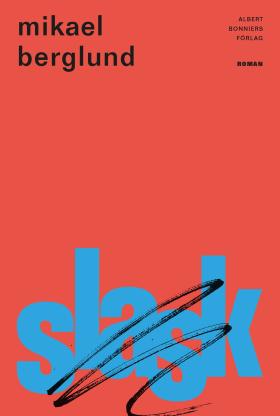
Slask
(Slush)
by Mikael Berglund
reviewed by Sophie Ruthven
Slush is everywhere in the transition period between winter and spring up in the cold north. New things and fresh starts are on their way, signalled by Valborg fires and the final days of snowboarding, and the ability to spend more time out in the woods or by the lake. However, it’s not only a time of change for the earth, but for Melvin and his friends Hannah and Mika too, who live in a nameless town in Norrland, northern Sweden.
Hannah gets all snuggly talking shit about Mika, and I like snuggling
Melvin and Hannah have been a couple for an indeterminate while now, but Hannah has just ended things. She’s not really in love with Melvin and would rather date someone else. Melvin appears to accept this inevitability. Mika was adopted by Swedish parents as a child along with her brother Markus, whose sudden death a few years ago she is still grieving. Mika is aloof and awkward, her behaviour sometimes hard for the other two to understand, and the friendship group is beginning to appear skewed, if it ever really was balanced.
The environmental world of Slush is in no way murky like its namesake or its characters, and the clarity of the setting and actions may be partly what enables the narrative to engender a sudden shift in appraisal for the first-person narrator, Melvin, halfway through. With the world shimmering in the light of spring, as the reader it feels impossible that anything could be hidden from you.
It is hard to put Melvin into the camp of consciously unreliable narrators, however. If he deceives the reader, it is really only because he deceives himself: he seems as knocked sideways by the new information as I was, as I turned back to re-read where things had gone wrong. Like Melvin, my only thought was how could Mika see things this way? But the moment I turned back, with Mika’s narrative in mind, it was there – perhaps – filtered through the perceptions of Melvin, and in one moment, everything was different, muddied. Berglund’s writing is so crisp and rich in unobtrusive detail that it’s impossible not to trust Melvin’s perspective from the start. This means the sudden change leads to a feeling of being deceived by Melvin, even though it’s never entirely clear what has happened. It seems likely Melvin has indeed done something wrong and decides to accept the consequences. Melvin’s youthful perspective is blind to a lot of things, concerned as it is for himself. Relationships as old as the ones he has with Hannah and Mika could be taken for granted even by more mature people, and when we’re young it’s even easier to overlook our responsibility for our actions that affect such relationships. But being blind to what we’re doing does not exonerate us from the consequences. All the same, the novel doesn’t appear to moralise overtly.
I hate her because she forces me to remember. Nothing I ever do is new to her, she just sits in the chair opposite me and waits for me to become normal.
What it means to belong, and what makes a friend, are key drivers in Slush. Can relationships formed by proximity survive, or is it inevitable that they fall apart over time? Do we assume we know what it means to be someone’s friend and simply act on that assumption, without any consultation? As things progress, the question of whether you could even call Mika, Melvin and Hannah a group of friends arises ever more frequently, and you wonder how things will look in a few years. Time moves fast, and Melvin’s observations of the behaviour of tweens – he and his friends only a few years ago – and the decisions made now that will impact their working lives give the impression of someone keeping their cool as they only just manage to tread water. Possible futures are glimpsed in the distant lives of Hannah’s family and Melvin’s relationship to his parents, as well as in the character of Jocke, at least thirty years old and the parent of a young child, who still hangs out with the protagonists and sometimes even younger teenagers. At times it seems Melvin wonders what makes a mature person: numerical age alone cannot determine this. And how does he avoid Jocke’s fate?
Berglund’s fourth novel is slim and written with the lightest of language, but nevertheless stays with you a long time after reading, just as snowmelt sinks into the spring earth to prepare for the new growth.

Slask
Albert Bonniers Förlag, 2024
137 pages
Foreign rights: Emelie Forsdahl, Albert Bonniers förlag
Nominated for the 2025 Norrland Literature Prize
Mikael Berglund is a writer, graphic designer and web programmer. Slask is his fourth novel. An extract from his third novel, Ovanjorden (‘The Aboveground’) which won Sveriges Radio's Novel Prize 2023, was published in SBR 2023:1 in Anna McGroarty’s translation.
